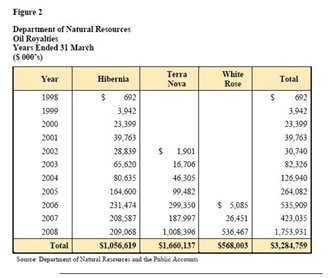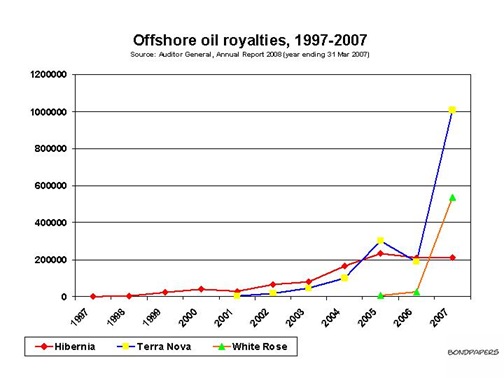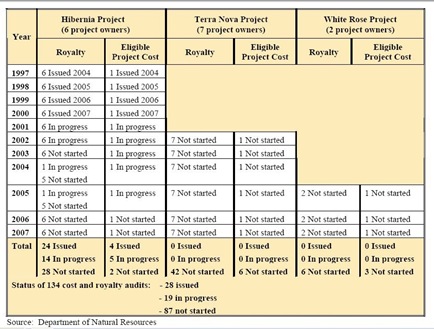In his most recent decision, information and privacy commissioner Ed Ring has struck a blow against government accountability.
He did so using faulty reasoning.
In April 2008, an unidentified individual requested the subject lines of all e-mails for seven people in the Executive Council for a two month period in early 2007 (March and April) and the subject lines of e-mails exchanged between an unidentified person and a communications director in government over a 12 month period in 2005.
The positions covered by the request were:
- Chief of Staff in the Premier’s Office
- Director of Communications in the Premier’s Office
- Principal Assistant to the Premier
- Deputy Chief of Staff in the Premier’s Office
- Director of Operations in the Premier’s Office
- Press Secretary to the Premier
- Director of Strategic Communications, Planning and Priorities (Executive Council), and the
- Premier
The information commissioner ruled the Executive Council did not have to respond to the request since the amount of time taken to process the request would represent an unreasonable interference in the operations of the Premier’s Office. He estimated the time involved would be eight months, assuming that 500 e-mails per day could be read and redacted in accordance with the open records laws.
The specific section of the access law the commissioner cited is an interesting one:
10. (1) Where the requested information is in electronic form in the custody or under the control of a public body, the head of the public body shall produce a record for the applicant where
(a) it can be produced using the normal computer hardware and software and technical expertise of the public body; and
(b) producing it would not interfere unreasonably with the operations of the public body.
As part of the review process, Ring asked the central computer support office of the provincial government to generate an estimate of the number of e-mails which might – possibly - be involved. He uses the number that resulted as the basis for his argument that the request constituted the unreasonable interference in regular operations.
That’s where the problems start.
The e-mail system used by government is readily searchable using a number of search parameters, including date, sender and recipient. Thus a specific set of information to deal with this requested was readily available using existing software, as required by the access act.
Inexplicably, Ring did not ask for a count of the actual number of e-mail subject headings involved in the specific request. That is the actual subject of the decision.
He did not ask even ask for the number of e-mails involved in the specific request. That’s a bit of a stretch anyway since the request asked for subject lines, not the actual e-mails themselves. Still, even that number was knowable since, as Ring decided, the original request was specific enough to meet the requirements under the law.
Instead, he asked the department to justify its estimate. He allowed the Executive Council to set up a seven day period selected by some arbitrary criteria. The reasons for taking this approach, what week was chosen and why aren’t disclosed. Ring then extrapolates all his subsequent numbers from that one week figure.
As Ring ought to be aware, the entire government bureaucracy searched more records for more people over a longer period in response to the Cameron Inquiry. They did so in the same time frame or in less time than the eight months Ring estimated for this request.
While the inquiry was different, the volume of work – which Ring uses as the entire justification for his decision – is greater for the inquiry. This request is also considerably less complicated than the previous information co-ordinator’s decision which Ring also cites.
This request asked only for subject lines which, contrary to his assertion, would not in itself require an individual to read the entire e-mail in each case to determine what ought to be redacted.
In short, there is no technical reason why the information could not have been collected and supplied, even in general form to Ring so that he could make a specific decision about a specific request.
Turning a specific request into a theoretical abstraction seems on the face of it to be an effort designed to frustrate the release of information.
Ring discusses at some length the possibility that the request could have been and might still be addressed if the applicant amended the request to break it down into smaller bites. There are a couple of problems with this, as well.
First, there was nothing to stop the department from beginning the process of releasing records based on the original request and doing so in the small bites suggested by both Ring and, apparently, the department’s access co-ordinator.
Asking to amend the request or to be “more specific” is odd. An applicant experienced with the way the provincial government handles access requests might well be suspicious that the efforts to change the request were illegitimate efforts to withhold information or to determine why the information was being requested.
Second, the department’s initial refusal to respond (or initial request for amendment to the request) was based on an overly narrow reading of the legislation. Most requestors are seeking information, not the creation of a “gotcha” situation on an abstract technicality.
Third, Ring had at his disposal several issues which suggests that the willingness to deal with this request may not have been as sincere as it first appears.
As Ring notes:
An Investigator from this Office initially asked for this information by e-mail dated 14 October 2008. Several follow-up communications were made to the Departmental Coordinator, asking when and if the information was forthcoming. The Coordinator could offer no response to these inquiries; she was not aware when the information would be provided to this Office or what the reason was for the delay. The requested information was finally received by this Office on 17 December 2008.
Take note of the line that the access co-ordinator could offer no response to the information commissioner’s inquiries, could not say when the information might be provided or provide any reason for the delay.
If that wasn’t bad enough, Ring had in front of him the infamous case of purple files already discussed publicly by The Telegram. In that case, the department responded falsely to a request claiming it had “no responsive records” on “purple files”. This was false since The Telegram had an e-mail in its possession – a responsive record under the law – that made specific reference to preparing a purple file. The newspaper filed an appeal of that response with Ring almost a year ago.
The sort of request made in this case isn’t unusual, especially in the modern day when more and more important records exist electronically. The Department of National Defence, for example, has been dealing with them for years. Their response is not to deny access or to try to alter the request, but to provide the information. Here’s an example from December 2008:
All communications created from 1 January 2008 to 28 May 2008, between the Access to Information Act Coordinator and the head of the Tiger Team vetting ATIA requests, including memos, e-mails, letters, minutes of meetings.
That’s a request that’s as big or bigger than the one involved here and it got an answer.
The trend toward increased government secrecy is all around. In the last session of the House, the government party passed amendments to the information management law. Those purposely changed the term “public record” to “government record”, which in itself suggests that the government records are not public. There was no obvious reason for the change of words.
More to the point, however, the amendments create an environment in which more public records are captured under the definition of cabinet records than before and those records may be destroyed under the exception created for the Executive Council. The go nicely with a nonsense section (section 6) inserted in the original access law that provides that other laws restricting access may over-ride the access law.
One cannot access records which do not exist and even the knowledge of such missing records can be withheld if one applies the correct amount of massaging to the letter of the law. That massaging just got a whole lot easier thanks to the latest decision by the information commissioner.
Of course, no one even remotely familiar with recent history will miss the point that part of the request sought records from 2005, the year the problems at Eastern Health first came to public light. Do those e-mails still exist, aside from the ones already disclosed to Cameron Inquiry? It’s a question that bears answering in light of government efforts to frustrate disclosure.
What of the other period, March and April 2007? That too is a rather sensitive period in light of evidence at Cameron, if nothing else.
Whoever made this request ought to take up the appeal to the Supreme Court’s trial division, as provided under the access law. The access law is designed to facilitate the release of information. Increasingly, though, Executive Council is interpreting the law in such a way as to justify withholding information. Ring’s decision winds up justifying withholding information without good reason. That’s a bad thing for people interested in accountability and access to public records.
The issues in this case are large enough to warrant an appeal to the courts. Maybe some people would be willing to pass the hat to help defray the legal bills.
-srbp-
 Within three months, Squires was out.
Within three months, Squires was out.



 The long-term effect of a drop in asset valuation is to force the government and maybe the unions to drop more cash into the fund. As Marshall noted, over the long haul, the pension fund’s asset valuation has gone up and down yearly but has average over 10% growth since it was created in 1981 [See chart at left].
The long-term effect of a drop in asset valuation is to force the government and maybe the unions to drop more cash into the fund. As Marshall noted, over the long haul, the pension fund’s asset valuation has gone up and down yearly but has average over 10% growth since it was created in 1981 [See chart at left].
